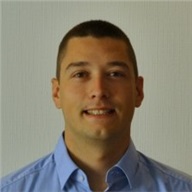For Erik Bollen (27), a fascinating thesis during his master's degree in computer science resulted in a practice-oriented PhD at VITO. As a member of the VITO Data Science Hub, he has been working on an overarching project within VITO for two years, in close cooperation with Hasselt University.
"VITO is truly an organisation in which there are many opportunities, both for employees, companies and science itself."
"With the PhD, we support different research units within VITO by developing a new approach to data management," says Erik Bollen. "Often researchers have to manage data from different networks in which measurements are done. This is so, for example, in research on hydrology and land management. We map the units' needs and look for solutions within the evolutions in information management. This allows research to run more smoothly."
After Erik's successful thesis, the idea was born to write the sequel with a PhD. "My former promoters, including Rik Hendrix and Professor Bart Kuijpers from Hasselt University, saw its potential, and wanted to broaden it to the other research units. When I committed, we wrote the PhD proposal together. That this emerged from my master's thesis is of course very nice. Today, I am very happy with this choice."
Three types of working days
As his work supports several research units, he gets to many places within VITO. Each day looks different for Erik. "I myself am part of the Data Science Hub. Every month, we visit the different research units within VITO. This way, I encounter many people in the organization, mainly in Mol and Genk."
Broadly speaking, there are three types of working days for Erik. "On the days I work from home, I mainly schedule online meetings and reading work. Other days, I am at the university, teaching computer science. On the days at VITO, I go to the Data Science Hub in Mol or make visits to the different units."
The Tour of Belgium
From an early age, Erik was fascinated by computer science, although it is not his only passion. Besides his work at VITO, something else takes up a lot of Erik's time: cycling racing.
"I have always loved sport and used to race. But today, I am primarily active as a race commissaire. I am the referee of the race, so to speak. Thus, I oversee the sporting aspect of regional, national, and international competitions. This ranges from the preparations and entries to validating the results. During winter months it is quiet, but in summer, there is at least one race per weekend. Sometimes, there is a stage race, such as the Tour of Belgium. I already did the Flèche Wallonne for the elite women and the cyclocross World Cup in Zolder. Of course, I support smaller, regional races too."
Erik's sports hobby brings about a positive cross-fertilization with his work. "In academia, you often take a long time to think. As a race commissaire, you do not always have that time. You learn to take quick decisions." On the other hand, the scientific approach of working detailed and considering all facets provides positive input into the race. Of course, in the heat of battle, Erik as race commissaire cannot overlook anything.
Promising environment
Erik's PhD takes four years in total, and he is now two years into it. "There is still half a research plan on the table to be implemented, so we stay busy. I hope to be able to help the different research units even more to facilitate their data management with new techniques."
For Erik, VITO is a privileged environment, where he was able to start working thanks to a successful master's thesis. "The fact that VITO bridges industry and research creates a lot of opportunities. It is an international environment with many people from outside Europe. But many regional researchers and PhD students are also active within VITO. In that respect, VITO really is an organization in which there are many opportunities, for employees, companies and for science itself."


